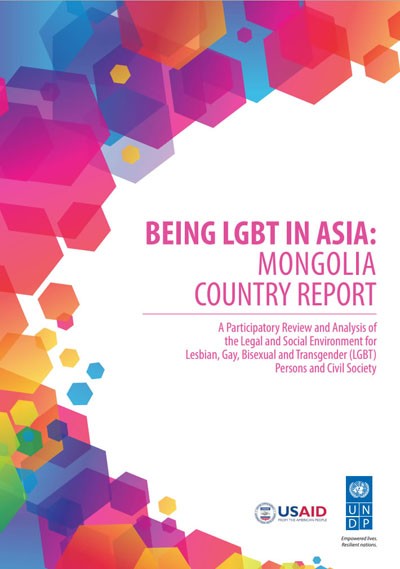
For Immediate Release
Ulaanbaatar, October 22, 2014, — Mongolia’s first report assessing the challenges for lesbian, gay, bisexual and transgender (LGBT) communities reveals they still face discrimination despite significant government policy changes that protect their rights. There is still societal homophobia and transphobia and LGBT people encounter social stigma and even violence in various settings such as families, employment, health care and public areas.
At the launching of the report, which is available in both English and Mongolian languages, Sezin Sinanoglu, Resident Representative of the United Nations Development Programme (UNDP) in Mongolia said “United Nations is committed to fighting discrimination based on sexual orientation and gender identity. Human beings cannot benefit from development progress if their lives are defined by inequity, exclusion, and policies which treat them as less than equal. LGBT people need to be given the opportunities to participate in and benefit fully from development”.
Released today, the ”Being LGBT in Asia” Mongolia Country Report – a joint analysis by the U.S. Agency for International Development (USAID) and the (UNDP) – highlights how there is very little published literature about diverse sexual orientation and gender identity issues in Mongolia. A broader human rights discourse, including on LGBT rights, began to emerge only after the country’s transition to a democratic system in 1992.
“Realizing an end to stigma and discrimination against LGBT people is an important part of America's human rights goals globally,” said U.S. Ambassador to Mongolia, Piper Campbell. “Truly sustainable development requires the broadest possible participation from all parts of any country's communities, including the LGBT community.”
This landmark report is the first comprehensive review and analysis of Mongolia’s legal and social environment on LGBT issues in the country. It encompasses in-depth research and findings and recommendations from the National LGBT Community Dialogue convened in Ulaanbaatar in March 2014.
According to the report, Mongolia was the first country in Asia to integrate LGBT issues in the sex education curriculum for schools in 1998. Despite this progress, Mongolian LGBT people live in a society where there is strong pressure to marry a person of the opposite sex and have children and those who do not are socially isolated and can face discrimination at work. A vast majority of Mongolia’s LGBT people remain in the closet, fearful of social stigma and discrimination. Suicidal thoughts among LGBT youth in the country is alarmingly high.
The report states that sex changes can be noted on birth certificates and citizen identity documents based on an amendment to the Civil Registration Law in 2009. In addition, revisions to the HIV law in 2012 introduced privacy protections for people living with HIV. Marriage, however, is still defined as a union between a man and a woman barring lesbian and gay people from marrying, adopting children or jointly owning property. The majority of LGBT people in a survey also reported experiencing abuse from law enforcement personnel including blackmail and violence. Instances of severe violence towards LGBT people from ultra-nationalist groups and others have also been recorded.
The Mongolia country report was produced as part of the ‘Being LGBT in Asia’ initiative launched on Human Rights Day in December 2012. It seeks to promote understanding of the fundamental challenges LGBT people face and help organizations in Asia document the progress being made in anti-discrimination efforts. It also makes a series of recommendations that are designed to complement the findings in different topical areas.
‘Being LGBT in Asia’ is a regional collaboration between USAID, the UNDP and LGBT civil society. Other UN agencies such as the Office of the United Nations High Commissioner for Human Rights (OHCHR), the United Nations Children’s Fund (UNICEF), UNAIDS and USAID country missions have also partnered with the initiative in individual countries. It is currently being implemented in Cambodia, China, Indonesia, Mongolia, Nepal, Thailand, the Philippines and Viet Nam.
Download the report here







Comment
Make a general inquiry or suggest an improvement.